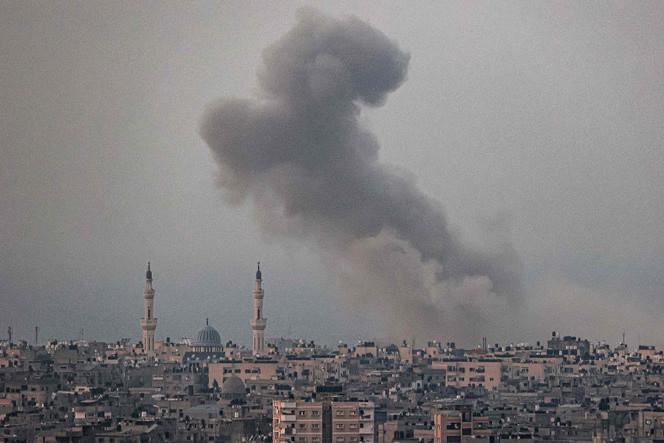


Israeli Prime Minister Benjamin Netanyahu told the nation Saturday night, October 28, that the military has opened a "second stage" in the war against Hamas by sending ground forces into Gaza and expanding attacks from the ground, air and sea. Casting the war as a fight for his country's very survival, he warned that the assault would intensify ahead of a broad ground invasion into the territory.
"There are moments in which a nation faces two possibilities: to do or die," Netanyahu said. "We now face that test and I have no doubt how it will end: We will be the victors. We will do and we will be the victors."
The bombardment, described by Gaza residents as the most intense of the war, knocked out most communications in the territory and largely cut off the besieged enclave's 2.3 million people from the world. The military released grainy images showing tank columns moving slowly in open areas of Gaza, many apparently near the border, and said warplanes bombed dozens of Hamas tunnels and underground bunkers. The underground sites are a key target in Israel’s campaign to crush the territory’s ruling group after its bloody incursion into Israel three weeks ago.
The escalation ratcheted up domestic pressure on Israel's government to secure the release of dozens of hostages seized in the October 7 rampage by Hamas, when militants stormed from Gaza into nearby Israeli towns and gunned down civilians and soldiers. The unprecedented attack during a major Jewish holiday initiated a war between Israel and Hamas that could spread into a broader Mideast conflict.
Desperate family members met with Netanyahu on Saturday and expressed support for an exchange for Palestinian prisoners held in Israel, a swap floated by the top Hamas leader in Gaza.
Netanyahu told the nationally televised news conference that Israel is determined to bring back all the hostages, and maintained that the expanding ground operation "will help us in this mission." He said he couldn’t reveal everything that is being done due to the sensitivity and secrecy of the efforts.
"This is the second stage of the war, whose objectives are clear: to destroy the military and governmental capabilities of Hamas and bring the hostages home," he said in his first time taking questions from journalists since the war began.
He didn't address calls for a cease-fire, but in a speech peppered with references to centuries of Jewish history and military conflicts, made clear his view that Israel's future depends on its success against "enemy" forces.
Netanyahu also acknowledged that the October 7 "debacle," in which more than 1,400 people were killed, would need a thorough investigation, adding that "everyone will have to answer questions, including me."
The Israeli military said it was gradually expanding its ground operations inside Gaza, while stopping short of calling it an all-out invasion. "We are proceeding with the stages of the war according to an organized plan," said the chief military spokesman, Rear Adm. Daniel Hagari. The comments hinted at a strategy of a staged escalation, instead of a massive and overwhelming offensive.
Early in the war, Israel amassed hundreds of thousands of troops along the border. Until now, troops had conducted brief nightly ground incursions before returning to Israel.
Despite the Israeli offensive, Palestinian militants have continued firing rockets into Israel, with the constant sirens in southern Israel a reminder of the threat.
The health ministry in Hamas-ruled Gaza said early Sunday that more than 8,000 had been killed in the Palestinian territory since the start of the war with Israel on October 7. Most of those killed have been women and minors, the ministry said. Ministry spokesman Ashraf al-Qidra told reporters that the disruption of communications has "totally paralyzed" the health network. Residents had no way of calling ambulances, and emergency teams were chasing the sounds of artillery barrages and airstrikes.
An estimated 1,700 people remain trapped beneath the rubble, according to the health ministry in the Gaza Strip, administered by Hamas, which has said it bases its estimates on distress calls it received.
The World Health Organization appealed to the "humanity in all those who have the power to do so to end the fighting now" in Gaza. "There are more wounded every hour. But ambulances cannot reach them in the communications blackout. Morgues are full. More than half of the dead are women and children," it said.
More than 1.4 million people across Gaza have fled their homes, nearly half crowding into UN schools and shelters, following repeated warnings by the Israeli military that they would be in danger if they remained in northern Gaza. A large number of residents have not evacuated to the south, in part because Israel has also bombarded targets in so-called safe zones where conditions are increasingly dire.
